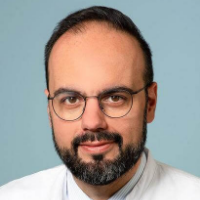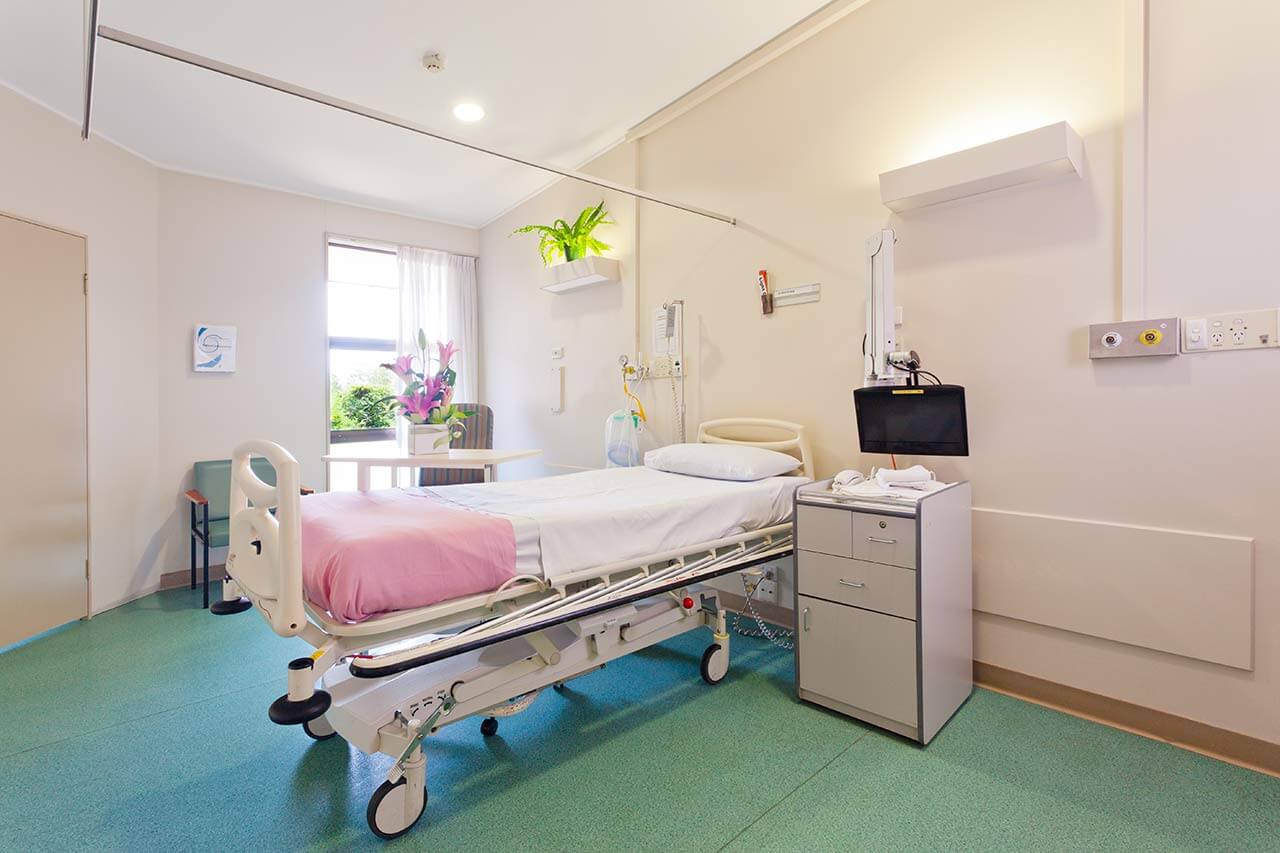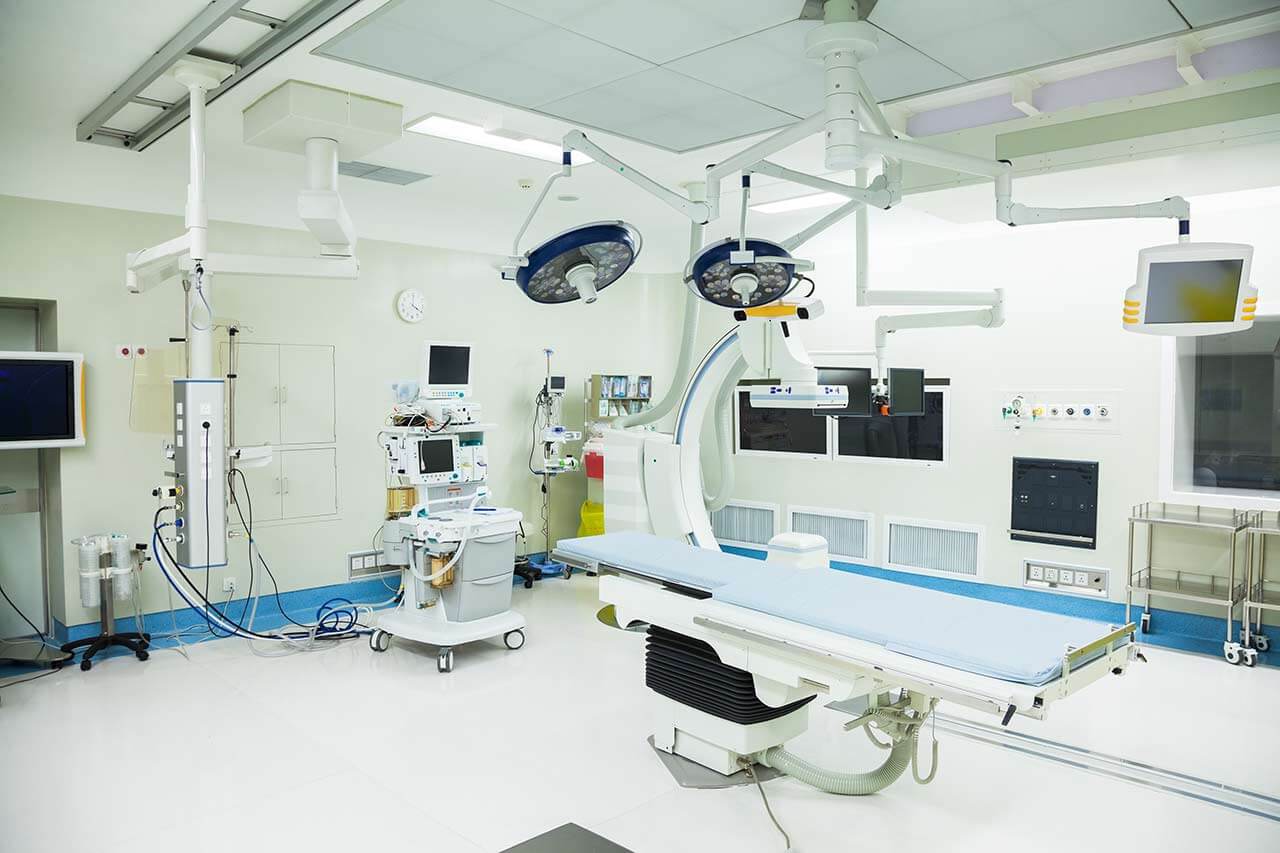
The program includes:
- Initial presentation in the clinic
- clinical history taking
- physical examination
- urological examination
- laboratory tests:
- complete blood count
- clinical urine test
- inflammation indicators
- tumor markers
- kidney function test
- indicators of blood coagulation
- PSA
- pelvic ultrasound
- CT scan (on indication 650 €)
- MRI scan (on indication 1200 €)
- nursing services
- consultation of all leading experts
- development of individual treatment plan
- written statement
Required documents
- Medical records
- Ultrasound scan/TRUS (if available)
Service
You may also book:
 BookingHealth Price from:
BookingHealth Price from:
About the department
The Department of Urology at the Hospital Bogenhausen Munich provides the full range of medical services in its field of competence. The team of the department's doctors specializes in the diagnostics and treatment of diseases of the urinary tract in women and men, as well as pathologies of the male genitalia. The focus is on the patients with prostate, kidney and bladder cancers, as well as on the patients with benign prostatic hyperplasia, kidney stone disease and urinary incontinence. The urologists have at their command both conservative and surgical treatment methods. In addition, laser technologies, 3D laparoscopy and the innovative da Vinci robot-assisted surgery are successfully used in clinical practice. When developing a treatment regimen, the specialists always give preference to those techniques that will allow achieving an optimal therapeutic result and maximally preserve the function of the affected organ. With over 2,700 patients every year, the department is the largest and leading clinic of its kind in southern Germany. During the therapeutic process, the doctors strictly adhere to the current clinical protocols and requirements of professional societies. The Chief Physician of the department is PD Dr. med. Atiqullah Aziz.
The department's medical team is proud of its long successful experience in the treatment of prostate cancer, which is one of the most common types of cancer in men. The patients usually require surgical removal of the tumor, which is complemented by chemotherapy and/or radiation therapy. The availability of modern technologies in the department allows the doctors to perform operations for prostate cancer using the da Vinci Xi Surgical System. Robot-assisted surgery is a real breakthrough in modern medicine and has a number of advantages over classic open interventions. The first and main advantage of the da Vinci surgery is its high precision, which allows the patient to maintain potency and normal urination after the operation. This is due to the fact that the sphincter muscle and small neurovascular plexuses located in the immediate vicinity of the prostate gland are not damaged. In addition, robot-assisted surgery is performed through several small skin incisions, which facilitates rapid postoperative recovery. Surgical manipulations during the operation are performed by a robot, but the commands are given by a surgeon sitting at a special control panel. During the intervention, the surgeon can see the operating field in multiple zooming, which ensures high accuracy. In addition, da Vinci robot-assisted surgical procedures are safer for the patient, because the robot ensures the absence of even minor tremors in the surgeon's hands.
Benign prostatic hyperplasia is also a fairly common disease in men. After receiving the diagnostic results and determining the stage of the pathology, urologists choose the most appropriate treatment tactics – conservative therapy or surgery. If, according to the examination results, the patient is indicated for the surgical treatment, then transurethral resection of the prostate gland is mostly performed. The intervention is performed endoscopically, and therefore trauma to healthy tissues is almost excluded. When diagnosed with a large prostate adenoma, the patient undergoes laparoscopic enucleation, which allows maintaining potency and excludes the development of urination disorders after surgery.
The department provides effective treatment for kidney and bladder cancer. To achieve a successful result, tumor resection is usually required. Surgery for kidney and bladder cancer is performed using minimally invasive techniques. Robot-assisted surgery is also often performed for kidney cancer. Urologists always strive to preserve the kidney by removing only the tissue affected by the oncological process. In addition, modern fluorescent technology FireFly is used in clinical practice, which makes it possible to accurately image the blood vessels of the kidney, which eliminates the risk of haemorrhage. In case of the advanced stages of cancer, the specialists have to resort to total kidney removal using 3D laparoscopic intervention. Open surgery for kidney cancer is extremely rare. If surgery is contraindicated for the patient (for example, due to serious concomitant diseases), radiofrequency or microwave ablation may be performed in collaboration with radiologists. In patients with bladder cancer, transurethral tumor resection is most often performed. The treatment regimen for kidney and bladder cancer is developed for each patient individually, at the interdisciplinary tumor board with the participation of doctors from related medical fields.
The department's range of medical services includes:
- Diagnostics and treatment of urologic cancers
- Prostate cancer
- Kidney cancer
- Bladder cancer
- Adrenal cancer
- Retroperitoneal cancer
- Ureteral cancer
- Seminal vesicle cancer
- Urethral cancer
- Testicular cancer
- 3D laparoscopy
- Da Vinci robotic surgery
- Open surgery (extremely rare)
- Radiofrequency or microwave ablation in contraindications to kidney surgery
- Diagnostics and treatment of benign prostatic hyperplasia
- Conservative treatment
- Transurethral prostate resection
- Laparoscopic enucleation of prostate adenoma
- Diagnostics and treatment of kidney stone disease
- Conservative treatment
- Minimally invasive interventions
- Diagnostics and treatment of urinary incontinence in men and women
- Diagnostics and treatment of acute infectious diseases of the urinary tract and male reproductive organs
- Diagnostics and treatment of other urologic diseases
Curriculum vitae
Higher Education and Professional Career
- Since 03.2019 Chief Physician of the Department of Urology at the Hospital Bogenhausen Munich.
- 04.2017 - 03.2019 Senior Physician in the Department of Urology at the University Hospital Rostock.
- 01.2015 - 12.2017 Distance training at the University of Hamburg for an MBA in Healthcare.
- 26.10.2015 Habilitation and Venia legendi, University Hospital Hamburg-Eppendorf. Thesis subject: "Stratification of the risk of urothelial bladder cancer on the basis of clinical and pathohistological prognostic parameters."
- 06.06.2015 Member of the European Board of Urology.
- 06.06.2015 Board certification in Urology.
- 06.2014 - 03.2017 Assistant Physician and later Specialized Physician in the Department of Urology, University Hospital Hamburg-Eppendorf, including rotation at the Martiniklinik, Hamburg.
- 09.2013 - 05.2014 Assistant Physician (rotation) in the Department of Pediatric Urology at the St. Hedwig Hospital.
- 01.2011 - 08.2013 Assistant Physician, Department of Urology at the Caritas Hospital St. Joseph.
- 03.2010 - 12.2010 Assistant Physician in the Department of General and Abdominal Surgery at the Hospital Bogenhausen Munich.
- 15.03.2010 Doctoral thesis defense.
- 10.2003 - 11.2009 Study of Human Medicine at the Georg August University of Göttingen.
Qualifications
- Board Certification in Urology.
- Member of the European Board of Urology.
- Master of Business Administration in Healthcare.
- Theoretical foundations of the specialty in Radiation Protection.
- X-ray scanning of the urinary tract.
Clinical Interests
- Robot-assisted surgery for prostate and kidney cancers.
- Radical cystectomy for bladder cancer.
- Minimally invasive treatment of benign prostatic hyperplasia.
- Minimally invasive treatment of kidney stone disease.
Prizes, Awards and Other Honors
- September 22, 2017 Rudolf Hohenfellner Prize, "Best Young Urologist" of the German Society of Urology at the 69th Congress of the German Society of Urology.
- June 17, 2016 Scientific Award of the Association of Urologists of Northern Germany at the 10th Congress of the Association of Urologists of Northern Germany in Berlin.
- 13 March 2016 Best Poster at the 31st Congress of the European Society of Urology in Munich.
- March 13, 2016 Best Abstract of the Resident of the 31st Congress of the European Society of Urology, Munich.
- 15 May 2014 Poster Award of the Bavarian Association of Urologists and the Austrian Society of Urology and Andrology, Erlangen.
- 28 September 2012 Best Poster at the 64th Congress of the German Society of Urology, Leipzig.
Memberships in Professional Societies
- Bavarian Association of Urologists (BUV).
- German Society of Urology (DGU).
- European Association of Urology (EAU).
- European Society of Urological Oncology (ESOU).
- European Society for Sexual Medicine (ESSM).
- German Society of Urological Residents (GeSRU).
- Society of Endourology.
- Association of Urologists of Northern Germany (VNU).
Photo of the doctor: (c) München Klinik Bogenhausen
About hospital
According to the reputable Focus magazine, the Hospital Bogenhausen Munich ranks among the ten best medical centers in Bavaria and among the top 50 medical facilities in Germany!
The medical facility is the Academic Hospital of Ludwig Maximilian University of Munich. The modern hospital with the highest level of services annually provides treatment to more than 85,000 patients with clinical cases of varying severity. With 1,000 beds, the hospital is the largest medical complex in the region. It provides both inpatient and outpatient treatment. In addition, the hospital has a 24-hour emergency service. The hospital's medical team consisting of highly qualified doctors and nursing staff focuses on tailored medical care, since they are convinced that every patient and his clinical case is unique. All employees of the hospital strive not only to provide the most effective treatment to the patient, but also to make his hospital stay as comfortable as possible. The work of doctors is based on respect and humane attitude towards their patients.
The hospital includes 18 specialized departments. Each department is responsible for the treatment of a particular group of diseases. The hospital is distinguished by outstanding successes in the treatment of diseases of the cardiovascular system, lungs and airways, gastrointestinal tract, musculoskeletal system, nervous system and metabolic disorders. Of particular interest is the treatment of cancers, which is provided on the basis of the Cancer Center certified in accordance with the standards of the German Cancer Society. The doctors of the hospital have a large arsenal of innovative treatment methods available only in the leading medical centers in Europe.
The high level of medical care is confirmed by the prestigious certificates of professional german medical societies. These are certificates of the German Cancer Society in the treatment of colon, pancreatic and esophageal cancers, a certificate of the German Cardiac Society, a certificate of the German Trauma Society, a certificate of the German Stroke Society and others.
The hospital has excellent conditions for the provision of comprehensive medical care. Long clinical experience of doctors in combination with high-tech medical equipment allows the specialist to work miracles, curing severe diseases, which doctors from other hospitals cannot cope with. The specialists of the hospital take care of both the physical health of patients and their emotional state, devoting enough time to personal communication. The efforts of the medical team are aimed at providing the patient with the most effective treatment and at completу cure of pathology, if possible.
Photo: (с) depositphotos
Accommodation in hospital
Patients rooms
The patients of the Hospital Bogenhausen Munich live in comfortable and cozy rooms with light colors. The hospital offers accommodation in single and double patient rooms. Each patient room has an ensuite bathroom with shower and toilet. The hospital also has patient rooms specially equipped for disabled people. The standard patient rooms include an automatically adjustable bed, a bedside table, a wardrobe, a table and chairs for receiving visitors. The patient rooms have Wi-Fi.
The hospital also offers enhanced-comfort patient rooms with a safe, a mini fridge and upholstered furniture.
The hospital has a library with many interesting books, magazines, CDs and DVDs. For the convenience of patients, the hospital also houses a small shop, a hairdresser and a cafe on its territory.
Meals and Menus
The patient and the accompanying person are offered tasty and healthy three meals a day. The diet is quite varied. Only fresh and high-quality products are used when cooking. Breakfast and dinner are usually served buffet style, while for lunch one can choose from three menus, including a dietary one.
If you are on a specific diet for some reason, you will be offered an individual menu. Please inform the medical staff about your dietary preferences prior to the treatment.
Further details
Standard rooms include:
Religion
The religious services are available upon request.
Accompanying person
During the inpatient program, the accompanying person can live with the patient in a patient room or a hotel of his choice. Our managers will help you choose the most suitable option.
Hotel
During the outpatient program, the patient can stay at the hotel of his choice. Our managers will help you choose the most suitable option.




